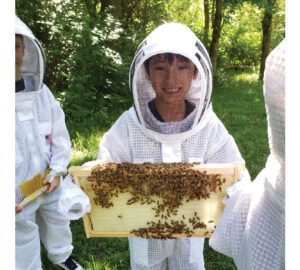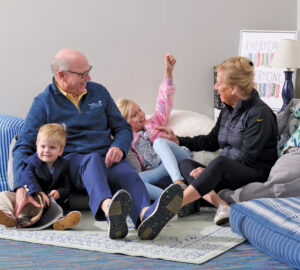It affects more children than pediatric cancer, diabetes and AIDS combined, yet much less is known about it. Autism spectrum disorder (ASD) is a neurodevelopmental disorder experienced by at least one in every 68 children in the U.S. It occurs in all racial, ethnic and socioeconomic groups, and generally appears before age 3. There is no single known cause, although genetics play a major role.
Thompson Center for Autism and Neurodevelopmental Disorders at the University of Missouri focuses on improving the lives of families affected by ASD and related disabilities. Launched in 2005 by Bill and Nancy Thompson, it’s a national leader in ASD care, research, professional training, community outreach and public policy. “We provide comprehensive services for more than 1,000 individuals and families annually, with the goal of helping each child achieve their maximum potential,” says executive director Stephen Kanne, Ph.D.
Thompson Center researchers and clinicians learn more about ASD every year, Kanne notes. “Each study brings us a few steps closer to earlier diagnosis, more individualized treatments, and better lives for our patients and their families,” he says. “Translating new knowledge into better care is always our priority.” Recently, the center partnered with Mercy Autism Center to expand clinical, educational and research opportunities, and also added a top behavior analyst and researcher from Johns Hopkins University School of Medicine, SungWoo Kahng, to its staff.
Among the 30 innovative research projects currently underway, neuropsychiatrist Dr. David Beversdorf is exploring how integrating ASD symptoms, genetic information and biological data from various research fields can lead to new treatment options. The center is also in the second phase of testing the Autism Impact Measure (AIM), a tool developed by Kanne and child psychologist Micah Mazurek that assesses the effectiveness of autism treatment. The study is funded by a $3.8 million grant from the National Institutes of Health. “A valid, reliable treatment outcome measure will help therapists and families quantify the impact of behavioral and drug therapies, and lead to more individualized treatments,” Kanne says. And geneticist Dr. Judy Miles and her University of Missouri colleague Gang Yao are studying pupillary light reflex, a possible biological marker for autism that may help diagnose the disorder at earlier ages, he adds.
Early diagnosis and intervention enables individuals with ASD to achieve more productive lives, but the financial cost is high. It’s in the Cards is an annual auction event benefiting Thompson Foundation, the center’s fundraising arm. The event, featuring St. Louis Cardinals players and coaches, takes place April 30 at the Marriott Renaissance Grand Hotel. Matt and Mackenzie Carpenter serve as honorary co-chairs.
“The auction provides resources for research, clinical care, education and financial aid for children and families who come to Thompson Center,” says foundation board member Jack Reis. “Our goal is to reach as many families as we can and make a real difference in quality of life for these kids, so they can function as fully as possible.”
[It’s in the Cards, the annual auction benefiting Thompson Foundation for Autism and Neurodevelopmental Disorders, takes place April 30 at the Marriott Renaissance Grand Hotel. For more information, call 314.550.2888 or visit thompsonfoundation.org/its-in-the-cards or facebook.com/itsinthecardscharityevent.]
Photo courtesy of Thompson Foundation for Autism








